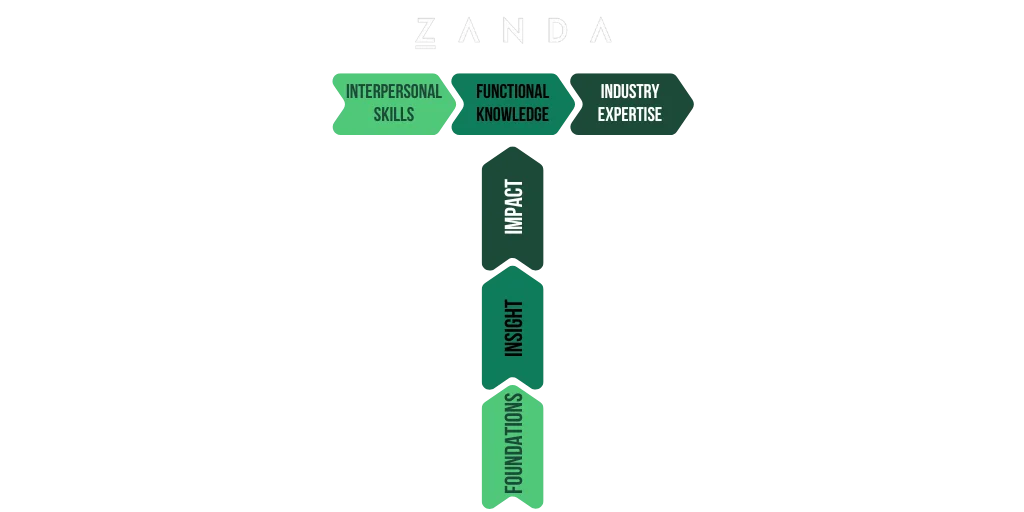Building a standout CV - What Matters Most & What Doesn’t
22 Jun, 20258 minutes
Forget the notion of your CV as just a job history; it's your personal prospectus, an investor pitch demanding attention. It's about forging a compelling narrative of your impact, trajectory, and growth that quickly hooks the reader in, so they want to learn more. It’s your story and a chance to highlight your chosen direction of travel & ambition for the future.
Leveraging over 80 years of combined senior finance recruitment experience and following thousands of CV reviews, the Zanda team reveals the secrets to crafting a CV that doesn't just open doors but kicks them down.
Don’t Lead with Your Qualifications, Lead with Your Impact
While your CIMA, ACA, ACCA, MBA, or CFA are foundational, they don't define the breadth of your career. Instead, your CV's opening is your prime opportunity to immediately demonstrate your unique value proposition and where you possess an unfair advantage in the market. Begin with a concise, impactful paragraph that highlights your tangible contributions and aligns with the role you're targeting. Remember to infuse relevant keywords for Applicant Tracking Systems (ATS) and Boolean searching.
Focus on:
Your years of experience: Quantify your journey – how long have you been making a measurable difference?
The types of businesses you've scaled or turned around: Showcase your relevant industry experience, ideally with growth metrics (e.g., "scaled a SaaS business from X to Y ARR").
A one-liner on your core value-add: What is your superpower (e.g., fundraising, international expansion, exit-readiness)? Ensure this directly aligns with the job description.
Here is an Example: "Strategic finance leader with 15+ years scaling VC-backed tech businesses from Seed to Series D, with £150m+ of capital raised and two successful exits."
In essence, by shifting the focus from academic credentials to quantifiable achievements and specific, tailored contributions, you compel readers to see beyond the paper and recognize the impactful finance leader you are.
Write Like an Investor Deck, Not a Job Spec
Your CV is not a mere list of responsibilities; it is a powerful track record of value creation, akin to an investor deck. Focus relentlessly on quantifiable outcomes and tangible impact, ensuring every achievement is backed by specific numbers and percentages.
Highlight areas such as:
Revenue growth: By how much, and over what period?
Margin improvement: What was the percentage increase or cost reduction?
Fundraising milestones: How much capital was raised, and what was your specific contribution? Who were the investors? etc
Team scale: How many people, and what was the impact of team growth?
Exit events: What was the outcome, and your role in it?
Each role should feature a maximum of 3–5 highly relevant bullet points. Frame your achievements by implicitly addressing the problem, your solution, and the resulting impact. This will instantly help you to remember those STAR formatted answers to tough compentancy based questions.
Always lead with the action and conclude with the precise, measurable results most pertinent to the role you're applying for. Start with you biggest achievement and work your way down in term of scale of positive impact.
Bad Example: “Responsible for implementing forecasting processes.”
Better Example: “Built dynamic forecasting model that reduced budget variance by 40% and supported a successful £10m Series B.”
Ultimately, transforming your CV into an investor deck means shifting from a narrative of duties to a compelling story of value creation. This strategic focus ensures your CV doesn't just recount tasks but powerfully articulates the significant contributions you've made to a business's success.
Context is Everything
Many CFO CVs fall short by omitting crucial business context. Never assume your reader is intimately familiar with every company you’ve worked for. For each role, paint a clear picture of the environment in which your achievements unfolded, thereby amplifying their perceived value.
Ensure you include:
Company stage and funding: (e.g., “VC-backed, Series A”)
Headcount and ARR: Provide a clear sense of scale.
Growth rate or key inflection point: Highlight the company\s trajectory during your tenure.
Industry Specifics: Clearly state the specific industry (e.g., FinTech, HealthTech, EdTech), especially if it\s highly relevant to your target role.
Market Conditions/Challenges: Briefly allude to the market landscape or specific challenges you navigated (e.g., "Navigated the company through a challenging Series B funding round during a market downturn").
Geographic Scope: For international roles, specify the key markets the company operated in.
Team Size/Structure: For senior roles, a brief mention of the finance team size or structure you managed can add valuable insight.
Here is an Example: "Early-stage B2B SaaS platform (£2m ARR, Series A, 30 FTE) operating across key European markets, backed by Notion and Seedcamp, successfully navigating rapid growth and preparing for Series B funding.”
By providing this crucial business context, your CV transcends a simple resume; it becomes a comprehensive snapshot that allows recruiters to immediately grasp the environment in which your achievements unfolded, thereby amplifying the perceived value of your contributions.
Less is More, Especially Above the Fold
The top half of page one is invaluable real estate on your CV. Recruiters often spend mere seconds scanning a resume initially, making visual appeal and immediate impact paramount. Keep this section clean, concise, and high impact to ensure your most compelling attributes are instantly visible.
Actively avoid:
Dense blocks of text: Opt for bullet points and white space to enhance readability.
Long lists of tools or responsibilities: Only include those directly relevant to the target role.
Generic buzzwords: Phrases like “dynamic,” “results-oriented,” or “team player” add little value. Instead, demonstrate these qualities through concrete achievements.
Prioritize clarity, quantifiable numbers, and content directly relevant to startup growth. The goal is to create an easily digestible, visually appealing summary that quickly communicates your core value before the reader even scrolls down.
Include Deals, Raises, and Exits - But Be Specific
For a CFO, your involvement in significant financial transactions / milestones, deals, raises, and exits, is paramount. This section is where you provide crystal-clear, granular detail, moving beyond mere mentions to showcase your direct contribution to a company\s most pivotal financial events.
For each transaction, be explicit about:
The Type of Transaction: Was it an M&A, divestiture, IPO, debt financing, venture debt, or a specific funding round (Seed, Series A, etc.)?
How much? Quantify the financial impact precisely (e.g., "£12m Series A").
What was your role? Define your specific contribution and responsibilities (e.g., "Led financial due diligence," "Negotiated terms").
What was the outcome? State the concrete result of your efforts (e.g., "Successful close," "Achieved strategic acquisition", “Hit EBITDA positive”).
Complexity/Challenges Overcome: Briefly highlight any significant hurdles you navigated (e.g., "Closed deal amidst regulatory changes," "Secured funding during market downturn").
Key Stakeholders/Partners: Mention relevant parties if impactful (e.g., "Collaborated with investment bank XYZ," "Engaged top-tier VCs").
Strategic Rationale/Impact: Briefly explain the broader strategic importance of the transaction for the company (e.g., "Enabled market expansion," "Secured runway for product development").
Here is an Example: “Led financial due diligence and investor engagement in £12m Series A (Octopus Ventures, 2022), successfully closing the round amidst a challenging economic climate, securing critical capital for product scale-up.”
By detailing your precise involvement and the concrete outcomes of these milestones, you unequivocally demonstrate your direct contribution to a company\s financial trajectory, solidifying your profile as a value-driving leader.
Tailor for the Job, Not the Archive
There is no such thing as a perfect, one-size-fits-all CV. A truly effective CFO CV is a dynamic document, meticulously adapted for each specific role you’re targeting. This isn't about fabricating experience but strategically highlighting and framing your existing expertise to resonate directly with the employer’s needs.
To tailor effectively:
Analyse the Job Description: Go beyond a quick read. Thoroughly dissect the job description for key responsibilities, required skills, and cultural nuances. This document is your blueprint for what to emphasize.
Research the Company Deeply: Invest time in understanding the company’s current trajectory. Look into recent news, funding rounds, strategic initiatives, and even the leadership team. This insight allows you to align your experience with their specific challenges and future aspirations.
Quantify Relevant Experience: Even when tailoring, the power lies in numbers. If a role demands SaaS experience, quantify your achievements within that context (e.g., "optimized SaaS revenue recognition processes, improving accuracy by X%"). Ensure the metrics you highlight are directly pertinent to the role’s requirements.
Ultimately, by meticulously tailoring your CV, you transform it from a generic historical record into a dynamic, highly relevant pitch. This strategic approach ensures your application speaks directly to the needs and aspirations of your prospective employer, significantly increasing your chances of standing out.
Include a Short ‘Career Summary’ Section if You’re Experienced
For CFOs with 15+ years of experience and multiple companies, a concise “Career Summary” can be an invaluable strategic tool. Its primary purpose is to provide a high-level, chronological overview of your significant career progression, especially when the full details of every early role are no longer essential. This section, typically placed after your initial impact statement but before your detailed role descriptions, should focus on company names, titles, and key dates.
Dedicate one line per role for these earlier positions, then detail the last 2–3 roles more thoroughly. While 15+ years is a general guideline, consider the relevance of your earlier roles to the target position when deciding whether to include this summary to prevent clutter and maintain focus on your most impactful recent experience.
Keep it to 2 Pages Max
You’re a CFO, not a historian. Your CV should be a strategic document, not an exhaustive chronicle. Focus relentlessly on what is relevant, impactful, and recent. This means making strategic omissions: if you’ve had a long career, you don’t need to list every role, especially those older than 15 years or pre-qualification. This isn’t a weakness; it demonstrates your understanding of what truly matters to a potential employer.
Adhering to a two-page maximum also encourages a cleaner layout and more white space, significantly improving readability and visual appeal.
Don’t Forget the ‘Human’ Element
Startup boards and founders aren’t just hiring a set of skills; they are hiring a person. While your financial acumen is paramount, a brief, authentic glimpse into what drives you outside of work can make your CV truly memorable and personal. A line or two about a passion, a significant hobby, or a commitment (from mentoring founders to marathon running) can help forge a connection and differentiate you from other highly qualified candidates. It adds a crucial human dimension, reminding the reader that beyond the numbers, there is a dynamic individual.
Final Thought: A Great CFO CV is Your Investor Pitch, For Yourself.
The best candidates treat their CV like a narrative: a compelling story of impact, trajectory, and growth. When done right, it opens doors before a conversation even starts. The more your cv highlights your key strengths and achievements it is highly likely this is where the bulk of the recruiter / interviewer time will be spent exploring.
The best candidates treat their CV not just as a document, but as a compelling narrative: a story of impact, trajectory, and growth. When crafted with strategic precision, your CV transcends a mere application; it becomes a powerful personal prospectus that doesn’t just open doors, but compels them to swing wide open, inviting further conversation before a word is even spoken.
If you would like a second set of eyes on your CV or are curious how yours stacks up in today’s market, get in touch with one of our consultants at Contact Us | Hire Finance Talent or Join Our Network | Zanda



